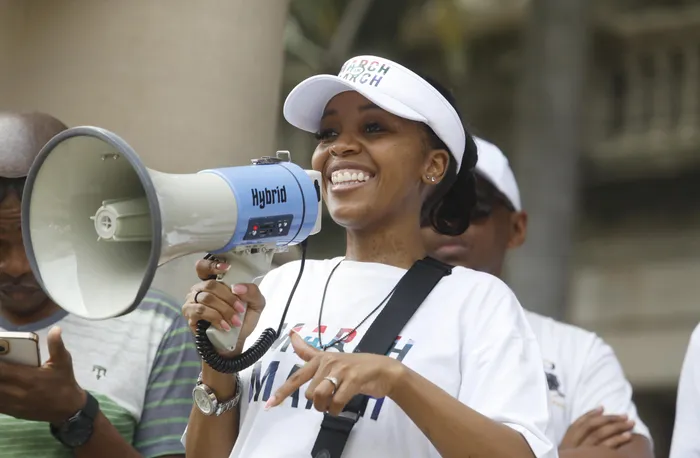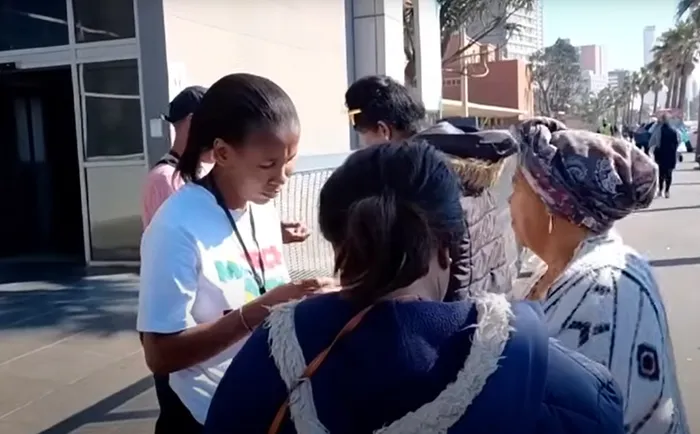Outrage as vigilante group targets foreigners: Who decides who receives medical attention and who does not?

Jacinta Ngobese-Zuma says she’s shocked to be named in an urgent court case by KZN Health MEC Nomagugu Simelane-Mngadi and awaits ruling.
Image: DOCTOR NGCOBO/Independent Newspapers
The father from the Congo was stopped at the entrance and even shoved while trying to enter the facility.
He was not alone.
All patients arriving for care are being stopped - not by security or hospital staff, but by a group of self-appointed gatekeepers demanding to see identification.
The March and March Movement, a vigilante group with no legal authority, has taken it upon itself to screen anyone approaching the facility’s doors, targeting undocumented immigrants and turning away those who can’t produce South African IDs.
The group's message is blunt: public healthcare is for South Africans who can produce their ID. Initially, their stance had been to rid the public healthcare system of "illegal" immigrants, but that has now changed, as legally documented foreigners, asylum seekers and refugees, like Kwigomba, are refused entry.
“I faced something that no human being should experience,” Kwigomba said. “Even pregnant women are being turned away. It’s a matter of life or death.”
Kwigomba, who is diabetic and relies on medication, says he cannot afford private care.
“We are just waiting to die,” he said. “They should remember the spirit of Ubuntu and stop kicking people out.”
March and March response
Teresa Nortje, March on March chairperson, makes no apologies.
“We’ve had an influx of undocumented immigrants who falsify papers,” she told IOL.
“We’re enforcing Section 17 of the Constitution and saying the country’s hospitals are for South Africans who pay tax.”
Section 17 of the Constitution guarantees the right to assemble, demonstrate, picket, and present petitions peacefully and unarmed. Section 17 of the Constitution does not allow any person or grouping, to prevent entry at health facilities, nor does it allow unauthorized bodies like March and March, to check and validate ID documents.
But while she cites constitutional rights to protest, the group’s actions fly in the face of another part of the Constitution - Section 27, which guarantees healthcare access to everyone in South Africa, regardless of immigration status.
Last week, the group was caught on camera shoving 77-year-old Crispin Hemson, 77, a former director of the Centre for Non-violence at the Durban University of Technology, after he refused to show them his ID.
Growing condemnation
KwaZulu-Natal Health MEC Nomagugu Simelane Mngadi, who has been in the firing line with the group and social media due to growing sympathies for founder Jacinta Ngobese Zuma, who had her radio contract at Vuma FM terminated.
Simelane Mngadi and her department have denounced the actions as “unlawful acts of vigilantism” earlier this month, stressing that “no member of the public or structure has the legal or moral authority to block others from accessing healthcare”.
Nationally, the Department of Health has also condemned the movement’s actions.
Spokesperson Foster Mohale called on protesters to raise concerns “within the confines of the law,” warning that the protests endanger lives and violate the Constitution and National Health Act.
“There’s a difference between being concerned and taking the law into your own hands,” Mohale said. “Everyone has the right to emergency and primary care.”

A member of March on March checks the IDs of two people coming for treatment.
Image: Screenshot
Police action to follow
Security plans are now in place to prevent further intimidation. Police and public order units have been deployed to protect health workers and patients.
The government has emphasised a zero-tolerance policy toward any group or individual attempting to block access to public health facilities.
The South African Human Rights Commission (SAHRC) has further stated that Section 27(1) of the Constitution of the Republic of South Africa, 1996, provides for healthcare for everyone.
"This constitutional provision means that all people in South Africa regardless of nationality, legal status, race, gender, age, income level, or geographic location are entitled to access basic healthcare services," it said.
This includes:
- South African citizens
- Refugees and asylum seekers
- Documented and undocumented migrants\
- Stateless persons
- Children, including separated, unaccompanied and stateless children.
- Persons in detention
- Vulnerable populations, such as persons with disabilities, the older persons, and persons living in poverty
"The Constitution does not qualify or limit this right based on immigration status or citizenship. It further states that no one may be refused emergency medical treatment. This provision ensures that emergency healthcare must be provided unconditionally by both public and private health facilities," the commission said.
Government intervention
The South African Police Service in collaboration with the Department of Health is deploying Public Order Police to maintain law and order during the protests at the affected health facilities.
"Law enforcement will continue to apply the zero tolerance approach for lawlessness, with decisive action taken against individuals taking the law into their own hands and intimidating patients at health facilities," said acting government spokesperson, Nomonde Mnukwa.
She added that while the government understands the genuine frustrations of many citizens regarding the pressures on public services, including overburdened clinics and exhausted healthcare workers, members of the public are urged to raise such concerns through lawful and appropriate channels.
"Taking the law into one’s own hands is unacceptable and undermines the values enshrined in our democratic Constitution," Mnukwa said.
IOL